University Essay: Impact of Cognitive Delay on Child Development
VerifiedAdded on 2022/09/02
|8
|2631
|11
Essay
AI Summary
This essay examines the impact of cognitive development delays on children, focusing on the cognitive domain. It explores how delays can affect a child's ability to think, learn, and interact, potentially leading to intellectual disabilities and social challenges. The essay highlights the crucial role of the Child and Family Health (CH&F) nurse in assessing the child's condition, providing support, and educating the family. It emphasizes the importance of creating a supportive environment, including strategies like spending quality time with the child, encouraging communication, and allowing exploration. The essay also stresses the need for early intervention and continuous monitoring to facilitate the child's development and well-being. The role of parents and the significance of a strong relationship between the child and the nurse are also discussed. The essay underscores the importance of addressing the child's psychological and social needs to foster healthy development.
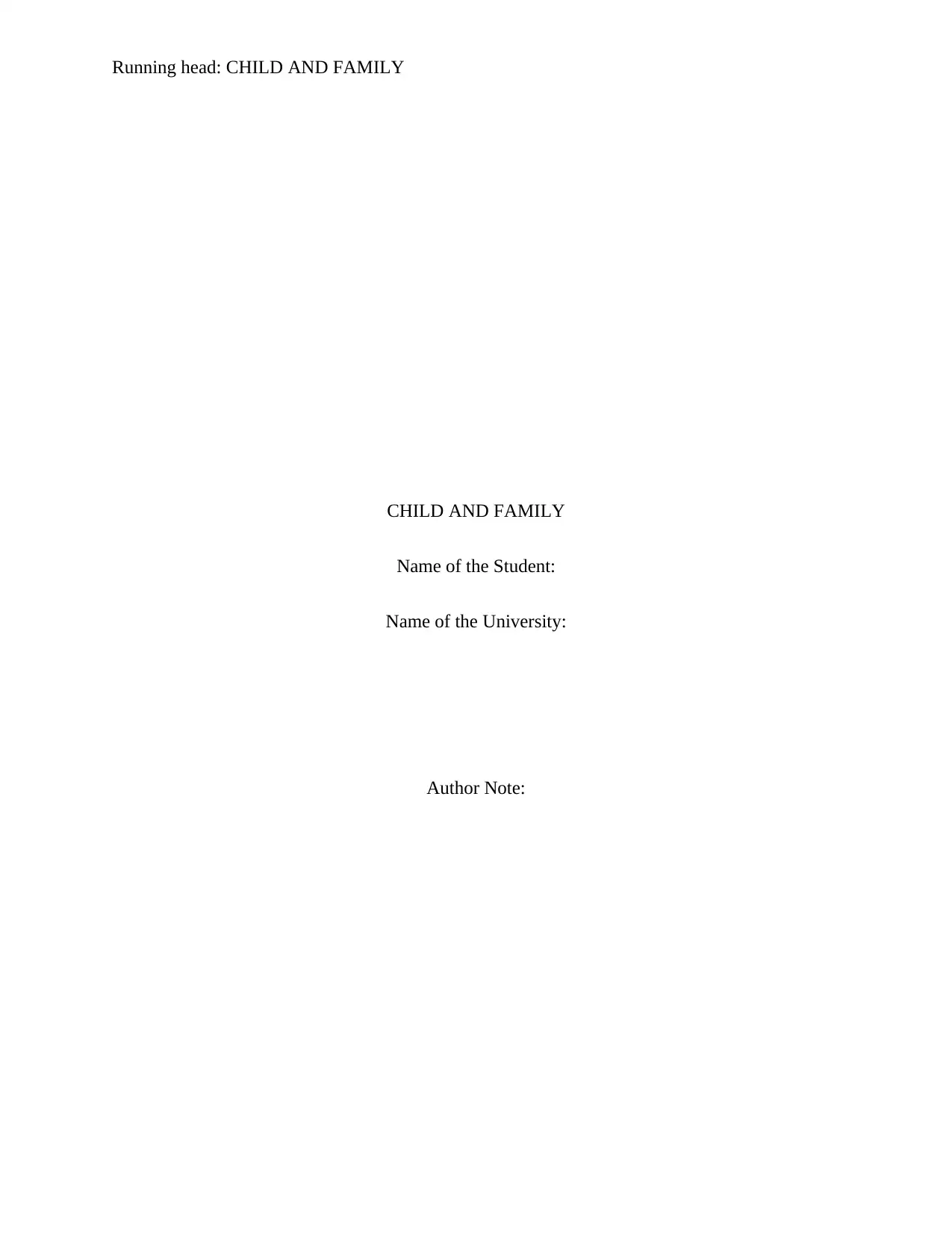
Running head: CHILD AND FAMILY
CHILD AND FAMILY
Name of the Student:
Name of the University:
Author Note:
CHILD AND FAMILY
Name of the Student:
Name of the University:
Author Note:
Paraphrase This Document
Need a fresh take? Get an instant paraphrase of this document with our AI Paraphraser
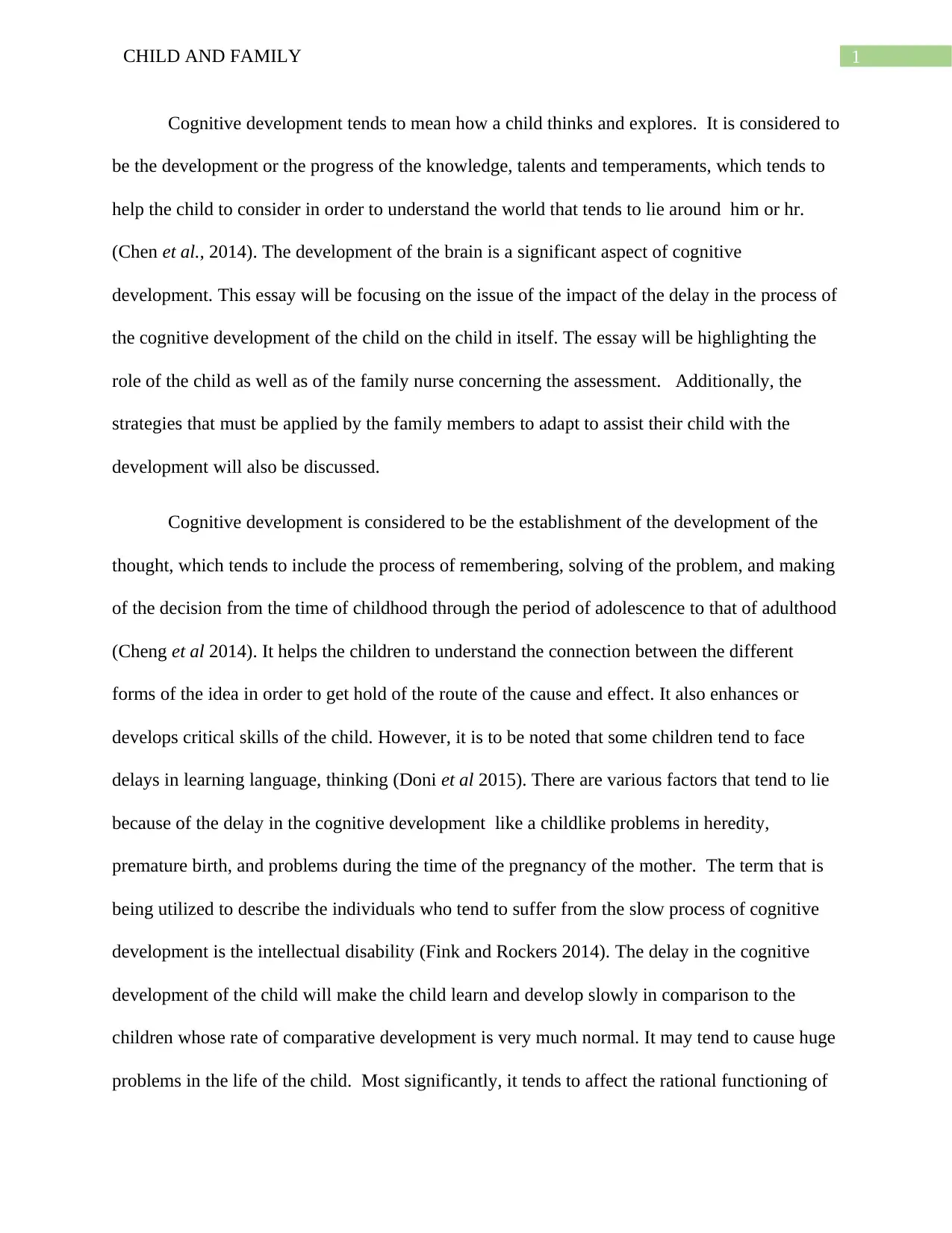
1CHILD AND FAMILY
Cognitive development tends to mean how a child thinks and explores. It is considered to
be the development or the progress of the knowledge, talents and temperaments, which tends to
help the child to consider in order to understand the world that tends to lie around him or hr.
(Chen et al., 2014). The development of the brain is a significant aspect of cognitive
development. This essay will be focusing on the issue of the impact of the delay in the process of
the cognitive development of the child on the child in itself. The essay will be highlighting the
role of the child as well as of the family nurse concerning the assessment. Additionally, the
strategies that must be applied by the family members to adapt to assist their child with the
development will also be discussed.
Cognitive development is considered to be the establishment of the development of the
thought, which tends to include the process of remembering, solving of the problem, and making
of the decision from the time of childhood through the period of adolescence to that of adulthood
(Cheng et al 2014). It helps the children to understand the connection between the different
forms of the idea in order to get hold of the route of the cause and effect. It also enhances or
develops critical skills of the child. However, it is to be noted that some children tend to face
delays in learning language, thinking (Doni et al 2015). There are various factors that tend to lie
because of the delay in the cognitive development like a childlike problems in heredity,
premature birth, and problems during the time of the pregnancy of the mother. The term that is
being utilized to describe the individuals who tend to suffer from the slow process of cognitive
development is the intellectual disability (Fink and Rockers 2014). The delay in the cognitive
development of the child will make the child learn and develop slowly in comparison to the
children whose rate of comparative development is very much normal. It may tend to cause huge
problems in the life of the child. Most significantly, it tends to affect the rational functioning of
Cognitive development tends to mean how a child thinks and explores. It is considered to
be the development or the progress of the knowledge, talents and temperaments, which tends to
help the child to consider in order to understand the world that tends to lie around him or hr.
(Chen et al., 2014). The development of the brain is a significant aspect of cognitive
development. This essay will be focusing on the issue of the impact of the delay in the process of
the cognitive development of the child on the child in itself. The essay will be highlighting the
role of the child as well as of the family nurse concerning the assessment. Additionally, the
strategies that must be applied by the family members to adapt to assist their child with the
development will also be discussed.
Cognitive development is considered to be the establishment of the development of the
thought, which tends to include the process of remembering, solving of the problem, and making
of the decision from the time of childhood through the period of adolescence to that of adulthood
(Cheng et al 2014). It helps the children to understand the connection between the different
forms of the idea in order to get hold of the route of the cause and effect. It also enhances or
develops critical skills of the child. However, it is to be noted that some children tend to face
delays in learning language, thinking (Doni et al 2015). There are various factors that tend to lie
because of the delay in the cognitive development like a childlike problems in heredity,
premature birth, and problems during the time of the pregnancy of the mother. The term that is
being utilized to describe the individuals who tend to suffer from the slow process of cognitive
development is the intellectual disability (Fink and Rockers 2014). The delay in the cognitive
development of the child will make the child learn and develop slowly in comparison to the
children whose rate of comparative development is very much normal. It may tend to cause huge
problems in the life of the child. Most significantly, it tends to affect the rational functioning of
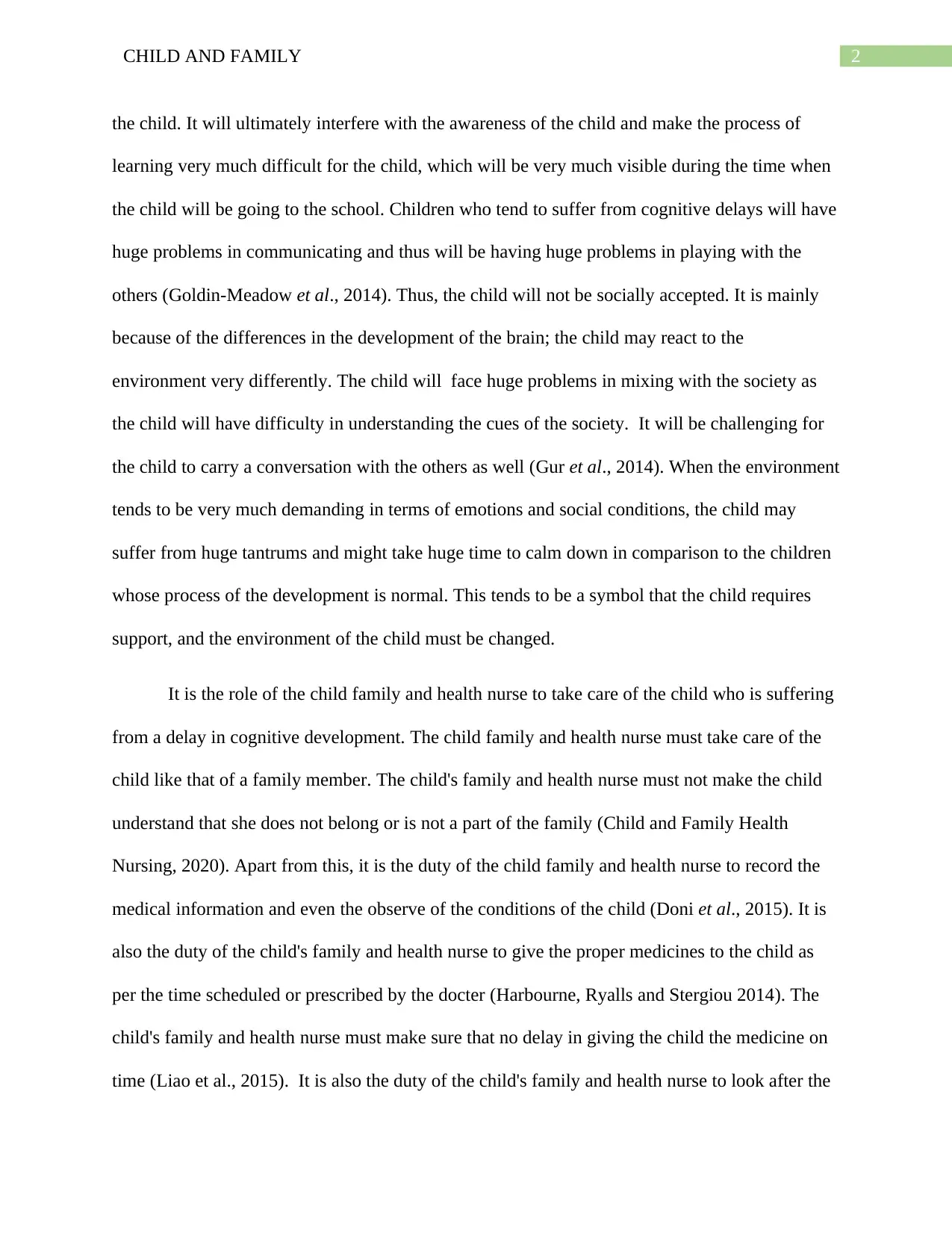
2CHILD AND FAMILY
the child. It will ultimately interfere with the awareness of the child and make the process of
learning very much difficult for the child, which will be very much visible during the time when
the child will be going to the school. Children who tend to suffer from cognitive delays will have
huge problems in communicating and thus will be having huge problems in playing with the
others (Goldin-Meadow et al., 2014). Thus, the child will not be socially accepted. It is mainly
because of the differences in the development of the brain; the child may react to the
environment very differently. The child will face huge problems in mixing with the society as
the child will have difficulty in understanding the cues of the society. It will be challenging for
the child to carry a conversation with the others as well (Gur et al., 2014). When the environment
tends to be very much demanding in terms of emotions and social conditions, the child may
suffer from huge tantrums and might take huge time to calm down in comparison to the children
whose process of the development is normal. This tends to be a symbol that the child requires
support, and the environment of the child must be changed.
It is the role of the child family and health nurse to take care of the child who is suffering
from a delay in cognitive development. The child family and health nurse must take care of the
child like that of a family member. The child's family and health nurse must not make the child
understand that she does not belong or is not a part of the family (Child and Family Health
Nursing, 2020). Apart from this, it is the duty of the child family and health nurse to record the
medical information and even the observe of the conditions of the child (Doni et al., 2015). It is
also the duty of the child's family and health nurse to give the proper medicines to the child as
per the time scheduled or prescribed by the docter (Harbourne, Ryalls and Stergiou 2014). The
child's family and health nurse must make sure that no delay in giving the child the medicine on
time (Liao et al., 2015). It is also the duty of the child's family and health nurse to look after the
the child. It will ultimately interfere with the awareness of the child and make the process of
learning very much difficult for the child, which will be very much visible during the time when
the child will be going to the school. Children who tend to suffer from cognitive delays will have
huge problems in communicating and thus will be having huge problems in playing with the
others (Goldin-Meadow et al., 2014). Thus, the child will not be socially accepted. It is mainly
because of the differences in the development of the brain; the child may react to the
environment very differently. The child will face huge problems in mixing with the society as
the child will have difficulty in understanding the cues of the society. It will be challenging for
the child to carry a conversation with the others as well (Gur et al., 2014). When the environment
tends to be very much demanding in terms of emotions and social conditions, the child may
suffer from huge tantrums and might take huge time to calm down in comparison to the children
whose process of the development is normal. This tends to be a symbol that the child requires
support, and the environment of the child must be changed.
It is the role of the child family and health nurse to take care of the child who is suffering
from a delay in cognitive development. The child family and health nurse must take care of the
child like that of a family member. The child's family and health nurse must not make the child
understand that she does not belong or is not a part of the family (Child and Family Health
Nursing, 2020). Apart from this, it is the duty of the child family and health nurse to record the
medical information and even the observe of the conditions of the child (Doni et al., 2015). It is
also the duty of the child's family and health nurse to give the proper medicines to the child as
per the time scheduled or prescribed by the docter (Harbourne, Ryalls and Stergiou 2014). The
child's family and health nurse must make sure that no delay in giving the child the medicine on
time (Liao et al., 2015). It is also the duty of the child's family and health nurse to look after the
⊘ This is a preview!⊘
Do you want full access?
Subscribe today to unlock all pages.

Trusted by 1+ million students worldwide
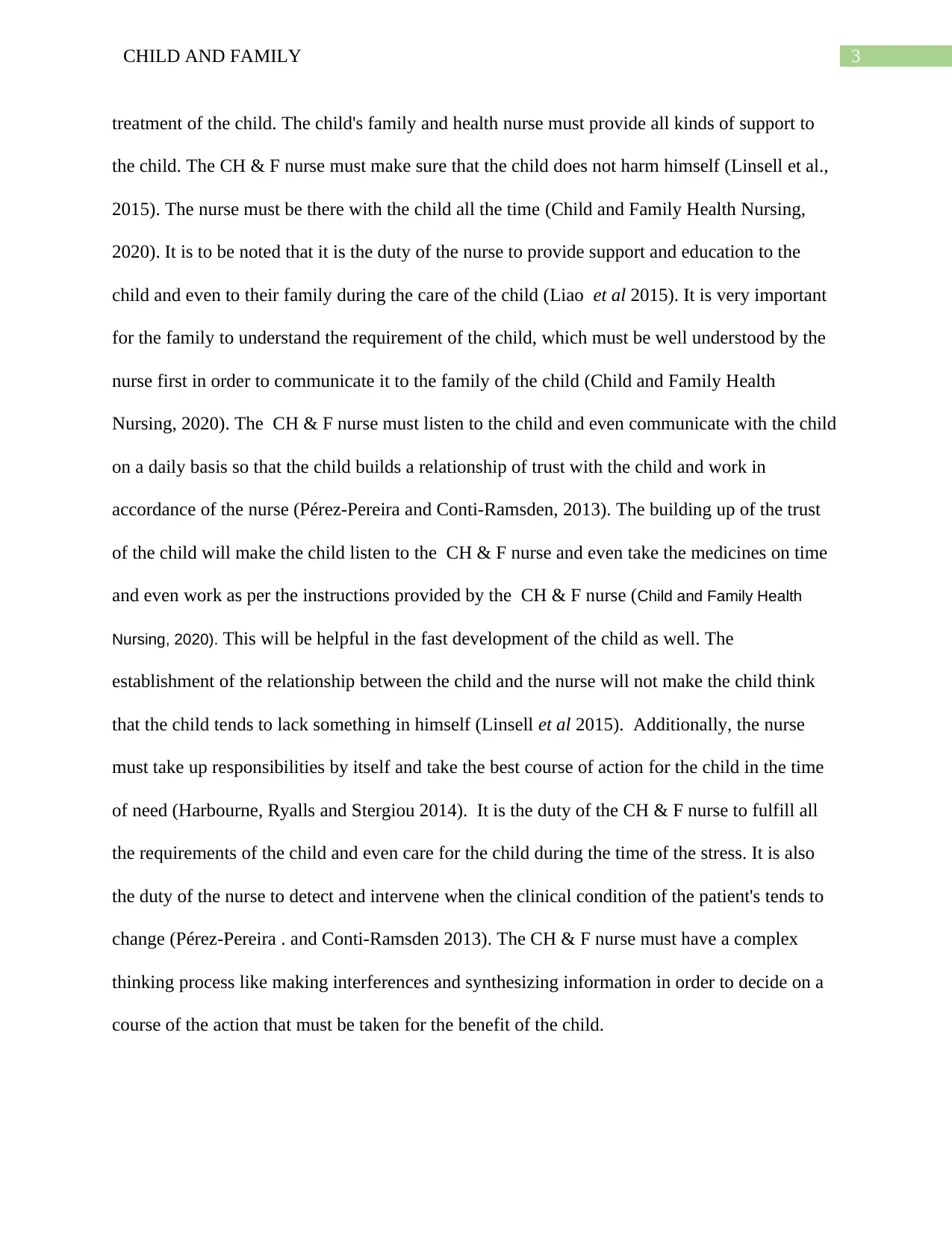
3CHILD AND FAMILY
treatment of the child. The child's family and health nurse must provide all kinds of support to
the child. The CH & F nurse must make sure that the child does not harm himself (Linsell et al.,
2015). The nurse must be there with the child all the time (Child and Family Health Nursing,
2020). It is to be noted that it is the duty of the nurse to provide support and education to the
child and even to their family during the care of the child (Liao et al 2015). It is very important
for the family to understand the requirement of the child, which must be well understood by the
nurse first in order to communicate it to the family of the child (Child and Family Health
Nursing, 2020). The CH & F nurse must listen to the child and even communicate with the child
on a daily basis so that the child builds a relationship of trust with the child and work in
accordance of the nurse (Pérez-Pereira and Conti-Ramsden, 2013). The building up of the trust
of the child will make the child listen to the CH & F nurse and even take the medicines on time
and even work as per the instructions provided by the CH & F nurse (Child and Family Health
Nursing, 2020). This will be helpful in the fast development of the child as well. The
establishment of the relationship between the child and the nurse will not make the child think
that the child tends to lack something in himself (Linsell et al 2015). Additionally, the nurse
must take up responsibilities by itself and take the best course of action for the child in the time
of need (Harbourne, Ryalls and Stergiou 2014). It is the duty of the CH & F nurse to fulfill all
the requirements of the child and even care for the child during the time of the stress. It is also
the duty of the nurse to detect and intervene when the clinical condition of the patient's tends to
change (Pérez-Pereira . and Conti-Ramsden 2013). The CH & F nurse must have a complex
thinking process like making interferences and synthesizing information in order to decide on a
course of the action that must be taken for the benefit of the child.
treatment of the child. The child's family and health nurse must provide all kinds of support to
the child. The CH & F nurse must make sure that the child does not harm himself (Linsell et al.,
2015). The nurse must be there with the child all the time (Child and Family Health Nursing,
2020). It is to be noted that it is the duty of the nurse to provide support and education to the
child and even to their family during the care of the child (Liao et al 2015). It is very important
for the family to understand the requirement of the child, which must be well understood by the
nurse first in order to communicate it to the family of the child (Child and Family Health
Nursing, 2020). The CH & F nurse must listen to the child and even communicate with the child
on a daily basis so that the child builds a relationship of trust with the child and work in
accordance of the nurse (Pérez-Pereira and Conti-Ramsden, 2013). The building up of the trust
of the child will make the child listen to the CH & F nurse and even take the medicines on time
and even work as per the instructions provided by the CH & F nurse (Child and Family Health
Nursing, 2020). This will be helpful in the fast development of the child as well. The
establishment of the relationship between the child and the nurse will not make the child think
that the child tends to lack something in himself (Linsell et al 2015). Additionally, the nurse
must take up responsibilities by itself and take the best course of action for the child in the time
of need (Harbourne, Ryalls and Stergiou 2014). It is the duty of the CH & F nurse to fulfill all
the requirements of the child and even care for the child during the time of the stress. It is also
the duty of the nurse to detect and intervene when the clinical condition of the patient's tends to
change (Pérez-Pereira . and Conti-Ramsden 2013). The CH & F nurse must have a complex
thinking process like making interferences and synthesizing information in order to decide on a
course of the action that must be taken for the benefit of the child.
Paraphrase This Document
Need a fresh take? Get an instant paraphrase of this document with our AI Paraphraser
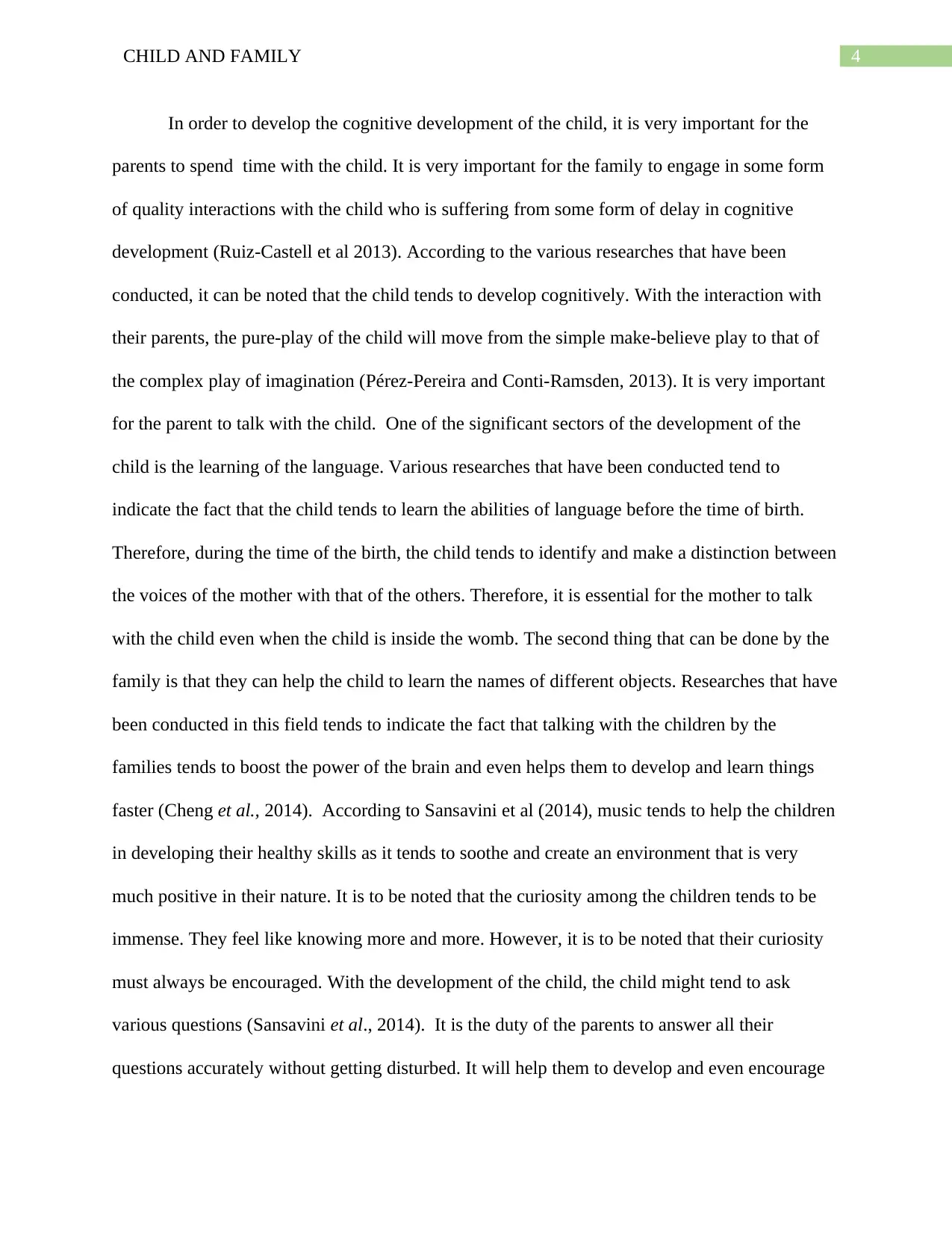
4CHILD AND FAMILY
In order to develop the cognitive development of the child, it is very important for the
parents to spend time with the child. It is very important for the family to engage in some form
of quality interactions with the child who is suffering from some form of delay in cognitive
development (Ruiz‐Castell et al 2013). According to the various researches that have been
conducted, it can be noted that the child tends to develop cognitively. With the interaction with
their parents, the pure-play of the child will move from the simple make-believe play to that of
the complex play of imagination (Pérez-Pereira and Conti-Ramsden, 2013). It is very important
for the parent to talk with the child. One of the significant sectors of the development of the
child is the learning of the language. Various researches that have been conducted tend to
indicate the fact that the child tends to learn the abilities of language before the time of birth.
Therefore, during the time of the birth, the child tends to identify and make a distinction between
the voices of the mother with that of the others. Therefore, it is essential for the mother to talk
with the child even when the child is inside the womb. The second thing that can be done by the
family is that they can help the child to learn the names of different objects. Researches that have
been conducted in this field tends to indicate the fact that talking with the children by the
families tends to boost the power of the brain and even helps them to develop and learn things
faster (Cheng et al., 2014). According to Sansavini et al (2014), music tends to help the children
in developing their healthy skills as it tends to soothe and create an environment that is very
much positive in their nature. It is to be noted that the curiosity among the children tends to be
immense. They feel like knowing more and more. However, it is to be noted that their curiosity
must always be encouraged. With the development of the child, the child might tend to ask
various questions (Sansavini et al., 2014). It is the duty of the parents to answer all their
questions accurately without getting disturbed. It will help them to develop and even encourage
In order to develop the cognitive development of the child, it is very important for the
parents to spend time with the child. It is very important for the family to engage in some form
of quality interactions with the child who is suffering from some form of delay in cognitive
development (Ruiz‐Castell et al 2013). According to the various researches that have been
conducted, it can be noted that the child tends to develop cognitively. With the interaction with
their parents, the pure-play of the child will move from the simple make-believe play to that of
the complex play of imagination (Pérez-Pereira and Conti-Ramsden, 2013). It is very important
for the parent to talk with the child. One of the significant sectors of the development of the
child is the learning of the language. Various researches that have been conducted tend to
indicate the fact that the child tends to learn the abilities of language before the time of birth.
Therefore, during the time of the birth, the child tends to identify and make a distinction between
the voices of the mother with that of the others. Therefore, it is essential for the mother to talk
with the child even when the child is inside the womb. The second thing that can be done by the
family is that they can help the child to learn the names of different objects. Researches that have
been conducted in this field tends to indicate the fact that talking with the children by the
families tends to boost the power of the brain and even helps them to develop and learn things
faster (Cheng et al., 2014). According to Sansavini et al (2014), music tends to help the children
in developing their healthy skills as it tends to soothe and create an environment that is very
much positive in their nature. It is to be noted that the curiosity among the children tends to be
immense. They feel like knowing more and more. However, it is to be noted that their curiosity
must always be encouraged. With the development of the child, the child might tend to ask
various questions (Sansavini et al., 2014). It is the duty of the parents to answer all their
questions accurately without getting disturbed. It will help them to develop and even encourage
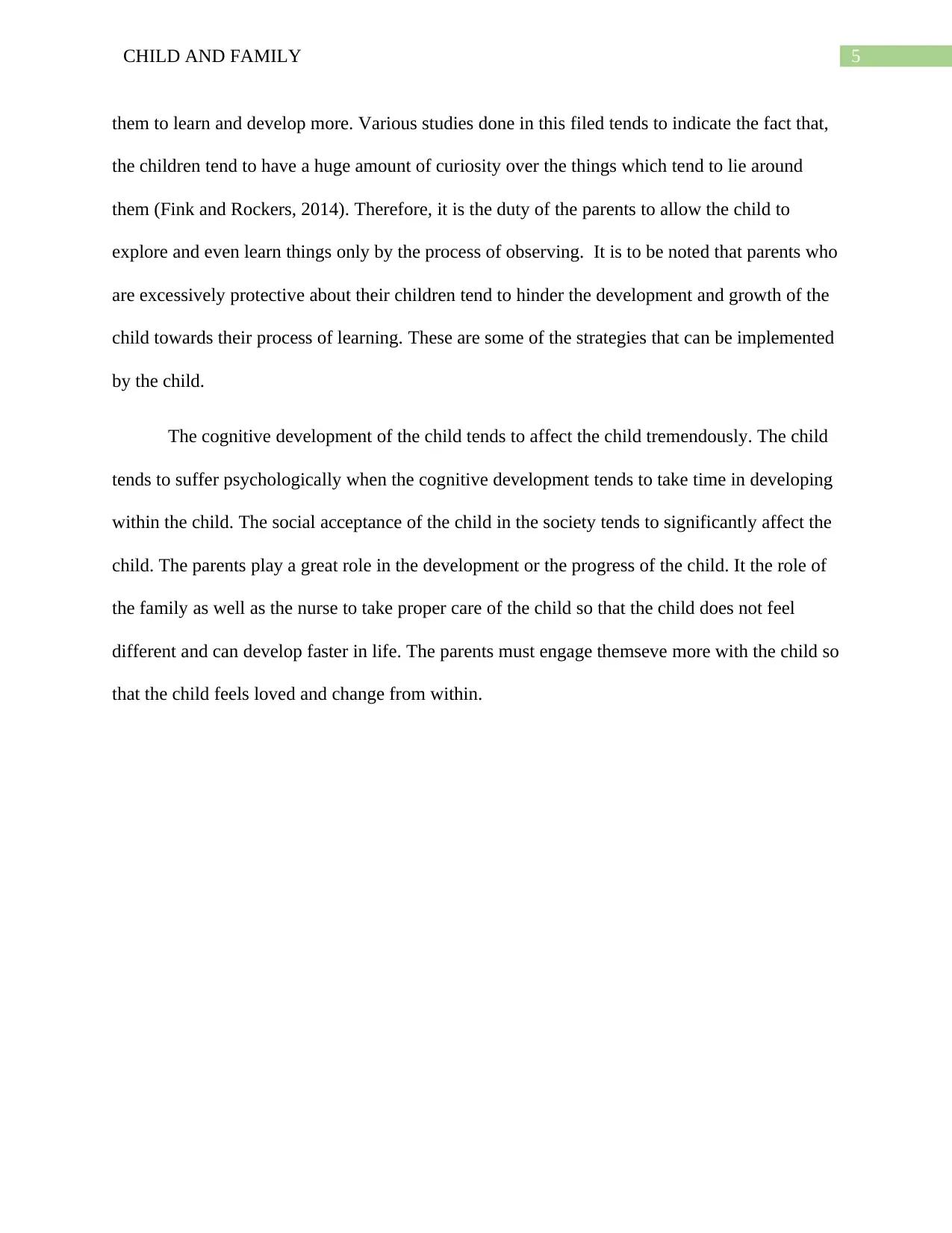
5CHILD AND FAMILY
them to learn and develop more. Various studies done in this filed tends to indicate the fact that,
the children tend to have a huge amount of curiosity over the things which tend to lie around
them (Fink and Rockers, 2014). Therefore, it is the duty of the parents to allow the child to
explore and even learn things only by the process of observing. It is to be noted that parents who
are excessively protective about their children tend to hinder the development and growth of the
child towards their process of learning. These are some of the strategies that can be implemented
by the child.
The cognitive development of the child tends to affect the child tremendously. The child
tends to suffer psychologically when the cognitive development tends to take time in developing
within the child. The social acceptance of the child in the society tends to significantly affect the
child. The parents play a great role in the development or the progress of the child. It the role of
the family as well as the nurse to take proper care of the child so that the child does not feel
different and can develop faster in life. The parents must engage themseve more with the child so
that the child feels loved and change from within.
them to learn and develop more. Various studies done in this filed tends to indicate the fact that,
the children tend to have a huge amount of curiosity over the things which tend to lie around
them (Fink and Rockers, 2014). Therefore, it is the duty of the parents to allow the child to
explore and even learn things only by the process of observing. It is to be noted that parents who
are excessively protective about their children tend to hinder the development and growth of the
child towards their process of learning. These are some of the strategies that can be implemented
by the child.
The cognitive development of the child tends to affect the child tremendously. The child
tends to suffer psychologically when the cognitive development tends to take time in developing
within the child. The social acceptance of the child in the society tends to significantly affect the
child. The parents play a great role in the development or the progress of the child. It the role of
the family as well as the nurse to take proper care of the child so that the child does not feel
different and can develop faster in life. The parents must engage themseve more with the child so
that the child feels loved and change from within.
⊘ This is a preview!⊘
Do you want full access?
Subscribe today to unlock all pages.

Trusted by 1+ million students worldwide
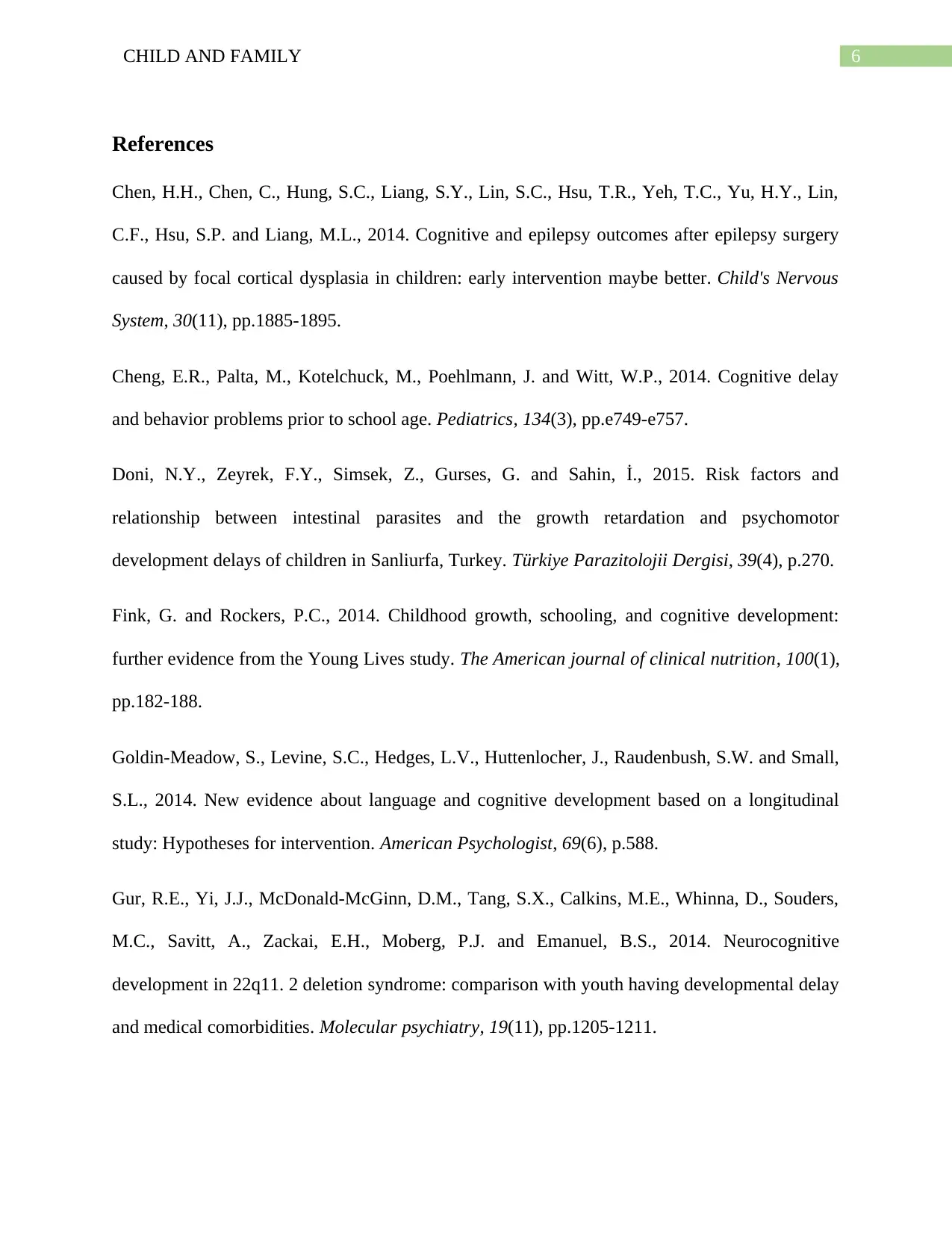
6CHILD AND FAMILY
References
Chen, H.H., Chen, C., Hung, S.C., Liang, S.Y., Lin, S.C., Hsu, T.R., Yeh, T.C., Yu, H.Y., Lin,
C.F., Hsu, S.P. and Liang, M.L., 2014. Cognitive and epilepsy outcomes after epilepsy surgery
caused by focal cortical dysplasia in children: early intervention maybe better. Child's Nervous
System, 30(11), pp.1885-1895.
Cheng, E.R., Palta, M., Kotelchuck, M., Poehlmann, J. and Witt, W.P., 2014. Cognitive delay
and behavior problems prior to school age. Pediatrics, 134(3), pp.e749-e757.
Doni, N.Y., Zeyrek, F.Y., Simsek, Z., Gurses, G. and Sahin, İ., 2015. Risk factors and
relationship between intestinal parasites and the growth retardation and psychomotor
development delays of children in Sanliurfa, Turkey. Türkiye Parazitolojii Dergisi, 39(4), p.270.
Fink, G. and Rockers, P.C., 2014. Childhood growth, schooling, and cognitive development:
further evidence from the Young Lives study. The American journal of clinical nutrition, 100(1),
pp.182-188.
Goldin-Meadow, S., Levine, S.C., Hedges, L.V., Huttenlocher, J., Raudenbush, S.W. and Small,
S.L., 2014. New evidence about language and cognitive development based on a longitudinal
study: Hypotheses for intervention. American Psychologist, 69(6), p.588.
Gur, R.E., Yi, J.J., McDonald-McGinn, D.M., Tang, S.X., Calkins, M.E., Whinna, D., Souders,
M.C., Savitt, A., Zackai, E.H., Moberg, P.J. and Emanuel, B.S., 2014. Neurocognitive
development in 22q11. 2 deletion syndrome: comparison with youth having developmental delay
and medical comorbidities. Molecular psychiatry, 19(11), pp.1205-1211.
References
Chen, H.H., Chen, C., Hung, S.C., Liang, S.Y., Lin, S.C., Hsu, T.R., Yeh, T.C., Yu, H.Y., Lin,
C.F., Hsu, S.P. and Liang, M.L., 2014. Cognitive and epilepsy outcomes after epilepsy surgery
caused by focal cortical dysplasia in children: early intervention maybe better. Child's Nervous
System, 30(11), pp.1885-1895.
Cheng, E.R., Palta, M., Kotelchuck, M., Poehlmann, J. and Witt, W.P., 2014. Cognitive delay
and behavior problems prior to school age. Pediatrics, 134(3), pp.e749-e757.
Doni, N.Y., Zeyrek, F.Y., Simsek, Z., Gurses, G. and Sahin, İ., 2015. Risk factors and
relationship between intestinal parasites and the growth retardation and psychomotor
development delays of children in Sanliurfa, Turkey. Türkiye Parazitolojii Dergisi, 39(4), p.270.
Fink, G. and Rockers, P.C., 2014. Childhood growth, schooling, and cognitive development:
further evidence from the Young Lives study. The American journal of clinical nutrition, 100(1),
pp.182-188.
Goldin-Meadow, S., Levine, S.C., Hedges, L.V., Huttenlocher, J., Raudenbush, S.W. and Small,
S.L., 2014. New evidence about language and cognitive development based on a longitudinal
study: Hypotheses for intervention. American Psychologist, 69(6), p.588.
Gur, R.E., Yi, J.J., McDonald-McGinn, D.M., Tang, S.X., Calkins, M.E., Whinna, D., Souders,
M.C., Savitt, A., Zackai, E.H., Moberg, P.J. and Emanuel, B.S., 2014. Neurocognitive
development in 22q11. 2 deletion syndrome: comparison with youth having developmental delay
and medical comorbidities. Molecular psychiatry, 19(11), pp.1205-1211.
Paraphrase This Document
Need a fresh take? Get an instant paraphrase of this document with our AI Paraphraser
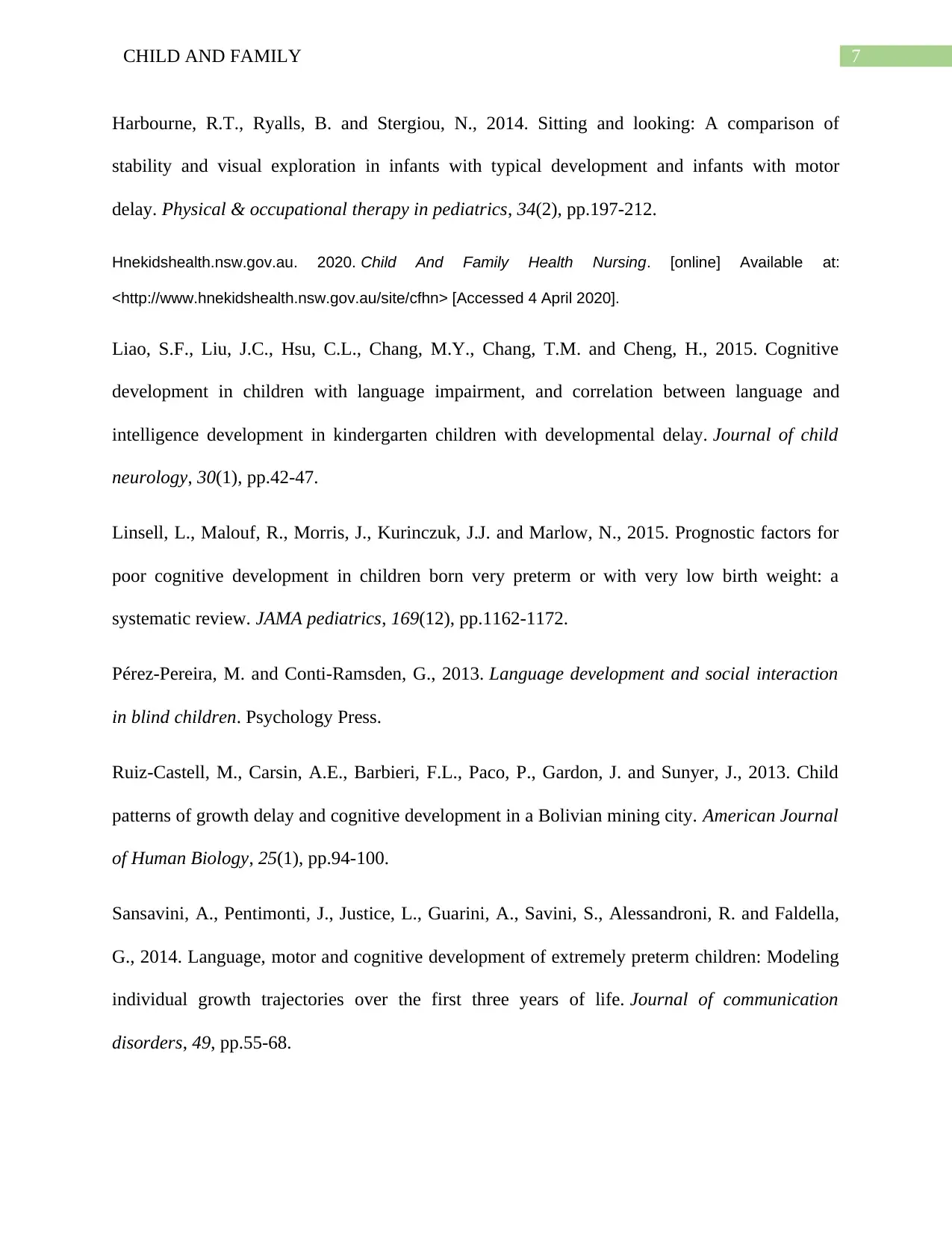
7CHILD AND FAMILY
Harbourne, R.T., Ryalls, B. and Stergiou, N., 2014. Sitting and looking: A comparison of
stability and visual exploration in infants with typical development and infants with motor
delay. Physical & occupational therapy in pediatrics, 34(2), pp.197-212.
Hnekidshealth.nsw.gov.au. 2020. Child And Family Health Nursing. [online] Available at:
<http://www.hnekidshealth.nsw.gov.au/site/cfhn> [Accessed 4 April 2020].
Liao, S.F., Liu, J.C., Hsu, C.L., Chang, M.Y., Chang, T.M. and Cheng, H., 2015. Cognitive
development in children with language impairment, and correlation between language and
intelligence development in kindergarten children with developmental delay. Journal of child
neurology, 30(1), pp.42-47.
Linsell, L., Malouf, R., Morris, J., Kurinczuk, J.J. and Marlow, N., 2015. Prognostic factors for
poor cognitive development in children born very preterm or with very low birth weight: a
systematic review. JAMA pediatrics, 169(12), pp.1162-1172.
Pérez-Pereira, M. and Conti-Ramsden, G., 2013. Language development and social interaction
in blind children. Psychology Press.
Ruiz‐Castell, M., Carsin, A.E., Barbieri, F.L., Paco, P., Gardon, J. and Sunyer, J., 2013. Child
patterns of growth delay and cognitive development in a Bolivian mining city. American Journal
of Human Biology, 25(1), pp.94-100.
Sansavini, A., Pentimonti, J., Justice, L., Guarini, A., Savini, S., Alessandroni, R. and Faldella,
G., 2014. Language, motor and cognitive development of extremely preterm children: Modeling
individual growth trajectories over the first three years of life. Journal of communication
disorders, 49, pp.55-68.
Harbourne, R.T., Ryalls, B. and Stergiou, N., 2014. Sitting and looking: A comparison of
stability and visual exploration in infants with typical development and infants with motor
delay. Physical & occupational therapy in pediatrics, 34(2), pp.197-212.
Hnekidshealth.nsw.gov.au. 2020. Child And Family Health Nursing. [online] Available at:
<http://www.hnekidshealth.nsw.gov.au/site/cfhn> [Accessed 4 April 2020].
Liao, S.F., Liu, J.C., Hsu, C.L., Chang, M.Y., Chang, T.M. and Cheng, H., 2015. Cognitive
development in children with language impairment, and correlation between language and
intelligence development in kindergarten children with developmental delay. Journal of child
neurology, 30(1), pp.42-47.
Linsell, L., Malouf, R., Morris, J., Kurinczuk, J.J. and Marlow, N., 2015. Prognostic factors for
poor cognitive development in children born very preterm or with very low birth weight: a
systematic review. JAMA pediatrics, 169(12), pp.1162-1172.
Pérez-Pereira, M. and Conti-Ramsden, G., 2013. Language development and social interaction
in blind children. Psychology Press.
Ruiz‐Castell, M., Carsin, A.E., Barbieri, F.L., Paco, P., Gardon, J. and Sunyer, J., 2013. Child
patterns of growth delay and cognitive development in a Bolivian mining city. American Journal
of Human Biology, 25(1), pp.94-100.
Sansavini, A., Pentimonti, J., Justice, L., Guarini, A., Savini, S., Alessandroni, R. and Faldella,
G., 2014. Language, motor and cognitive development of extremely preterm children: Modeling
individual growth trajectories over the first three years of life. Journal of communication
disorders, 49, pp.55-68.
1 out of 8
Related Documents
Your All-in-One AI-Powered Toolkit for Academic Success.
+13062052269
info@desklib.com
Available 24*7 on WhatsApp / Email
![[object Object]](/_next/static/media/star-bottom.7253800d.svg)
Unlock your academic potential
Copyright © 2020–2026 A2Z Services. All Rights Reserved. Developed and managed by ZUCOL.





